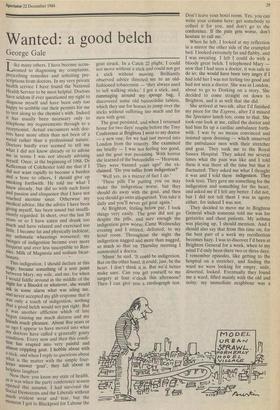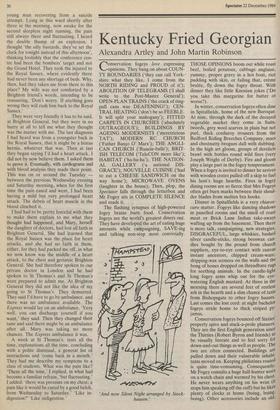Wanted: a good belch George Gale L ike many others, I
have become accus- tomed to diagnosing my complaints, prescribing remedies and soliciting pre- scriptions from doctors. In my very private health service I have found the National Health Service to be most helpful. Doctors have seldom if ever questioned my right to diagnose myself and have been only too ha —
Ppy to scribble out their permits for me to trot along to the chemist's with. Indeed it has usually been necessary only to telephone my requirements through to a receptionist. Actual encounters with doc- tors have more often than not been of a social rather than a professional nature. Doctors hardly ever seemed to tell me what I did not know already or to advise me in terms I was not already advising Myself. Once, at the beginning of 1968, Dr Kellerman of Colchester told me that if I did not want rapidly to become a burden and a bore to others, I should give up smoking forthwith. He told me what I knew already, but did so with such force and passion and eloquence that I have not touched nicotine since. Otherwise my Medical advice, like the advice I have been giving myself, has been sound but insuffi- ciently regarded. In short, over the last 30 Years or so I have eaten and drunk too much and have relaxed and exercised too little. I became fat and physically indolent; my asthmatic wheezings worsened; my twinges of indigestion became ever more frequent and ever less susceptible to Ren- hies, Milk of Magnesia and sodium bicar- bonate.
This indigestion, I should declare at this stage, became something of a sore point between Mary, my wife, and me, for when I
would fiddle around in the middle of the night for a Bisodol or whatever, she would ask in some alarm what was ailing me. and never accepted my glib response that it was only a touch of indigestion, nothing that a good belch would not put right. But It was another affliction which of late began causing me much distress and my "lends much pleasure. About five years or s° ago I appear to have moved into what MY doctors have called a generally gouty condition. Every now and then this condi- tion has erupted into very painful and almost crippling gout. I hobble about with a stick, and when I reply to questions about What is the matter with the simple four- letter answer 'gout', they fall about in helpless laughter.
Now then: you know my state of health, as it was when the party conference season 2Pened this autumn. I had survived the Social Democrats and the Liberals without Much evident wear and tear, but the Moment I got to Blackpool for Labour the gout struck. In a Catch 22 plight, I could not move without a stick and could not get a stick without moving. Brilliantly observed advice directed me to an old- fashioned tobacconist — 'they always used to sell walking sticks.' I got a stick, and, rummaging around my sponge bag, I discovered some old butozolidin tablets, which they use for horses to jump over the sticks without suffering too much and for men with gout.
The gout persisted, and when I returned home for two days' respite before the Tory Conference at Brighton I went to my doctor -- a new one, for we had just moved into London from the country. She examined me briefly — I was not feeling too good, and the gout was persisting. With horror she learned of the butozolidin — 'Heavens. They were banned years ago!' she ex- claimed. 'Do you suffer from indigestion?'
'Well yes, as a matter of fact I do.'
'These pills I'm putting you on may make the indigestion worse, but they should do away with the gout, and then you should go onto allopurinol. You take it daily and you'll never get gout again.'
At Brighton, feeling below par, I took things very easily. The gout did not go despite the pills, and sure enough the indigestion grew worse. Came Wednesday evening and I retired, defeated, to my hotel room. Throughout the night the indigestion nagged and more than nagged, so much so that on Thursday morning I summoned a doctor.
`Mmm' he said. 'It could be indigestion. But on the other hand, it could, just, be the heart. I don't think it is. But we'd better make sure. Can you get yourself to my surgery at four o'clock this afternoon? Then I can give you a cardiograph test.
Don't leave your hotel room. Yes, you can write your column here; get somebody to collect it for you, and don't go to the conference. If the pain gets worse, don't hesitate to call me.'
When he left, I looked at my reflection in a mirror the other side of the crumpled bed. I looked extremely fat and flabby, and I was sweating. I felt I could do with a bloody great belch. I telephoned Mary now that I had seen a doctor, it was safe to do so; she would have been very angry if I had told her I was not feeling too good and had not seen a doctor. She was in London, about to go to Dorking on a story. She decided to come straight on down to Brighton, and it as well that she did.
She arrived at two-ish, after I'd finished my piece for the Express, after I'd missed the Spectator lunch too, come to that. She took one look at me, called the doctor and had him fix up a cardiac ambulance forth- with. I was by no means convinced and insisted upon dressing — which unnerved the ambulance men with their stretcher and gear. They took me to the Royal Sussex Hospital. They asked me several times what the pain was like and I told them it was there all the time but that it fluctuated. They asked me what I thought it was and I told them indigestion. They took tests. They gave me something for the indigestion and something for the heart, and asked me if I felt any better. I did not, but I did not tell them I was in agony either, for indeed I was not.
They decided to move me to Brighton General which someone told me was for geriatrics and chest patients. My asthma was playing up, I should mention. And I should also say that from this time on, for the best part of a week my recollection becomes hazy. I was to discover I'd been at Brighton General for a week, when to my mind I'd only been there two or three days. I remember episodes, like getting to the hospital on a stretcher, and finding the ward we were looking for empty, unlit, deserted, locked. Eventually they found me a ward, filled mainly with the old and noisy; my immediate neighbour was a young man recovering from a suicide attempt. Lying in this ward shortly after three in the morning, now awake for the second sleepless night running, the pain still always there and fluctuating, I heard the double thump of an explosion. I thought 'the silly bastards, they've set the clock for tonight instead of this afternoon', thinking foolishly that the conference cen- tre had been the bombers' target and not the Grand Hotel. They took the injured to the Royal Sussex, where evidently there had never been any shortage of beds. Why, then, had they taken me from there to this place? My wife was not comforted by a Brighton friend's words, intending to be reassuring, 'Don't worry. If anything goes wrong they will rush him back to the Royal Sussex.'
They were very friendly it has to be said, at Brighton General, but they were in no hurry at all to tell me what they thought was the matter with me. The last diagnosis I had heard was from a youngster back in the Royal Sussex, that it might be a hiatus hernia, whatever that was. Then at last they began saying I'd had a heart attack. I did not by now believe them. I asked them to prove it. Eventually, with cardiograms and with blood analysis they made their point. This was on or around the Tuesday between the previous Wednesday evening and Saturday morning, when for the first time the pain eased and went, I had been having a mild but very prolonged heart attack. The debris of heart muscle in the blood clinched it.
I had had to be pretty forceful with them to make them explain to me what they thought had happened, and Mary, herself . the daughter of doctors, had lost all faith in Brighton General. She had learned that the Royal Sussex was the place for heart attacks, and she had no faith in them, either, for they had packed me off, in what we now know was the middle of a heart attack, to the chest and geriatric Brighton General. She had therefore spoken to our private doctor in London and he had spoken to St Thomas's and St Thomas's were prepared to admit me. At Brighton General they did not like the idea of my going to St Thomas's. They demurred. They said I'd have to go by ambulance, and there was no ambulance available. The Express would lay on an ambulance. 'Very well, you can discharge yourself if you want,' they said. Then they changed their tune and said there might be an ambulance after all. Mary was taking no more chances. The Express ambulance it was.
A week at St Thomas's: tests all the time, explanations all the time, concluding with a polite dismissal, a general list of instructions and 'come back in a month.' They had me describe my symptons to a class of students. What was the pain like? 'There all the time,' I replied, in what had become a familiar refrain, 'but fluctuating.' I added: 'there was pressure on my chest; a pain like it would be cured by a good belch, from Wednesday to Saturday.' Like in- digestion?' Like indigestion.'







































































 Previous page
Previous page